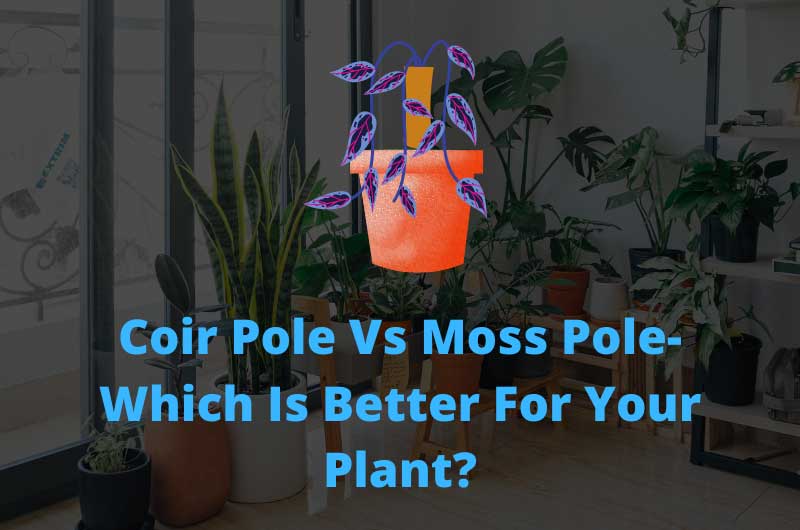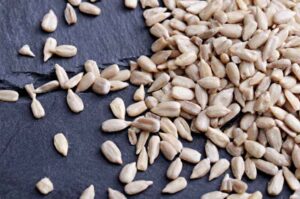Coir Pole Vs Moss Pole- Which Is Better For Your Plant?
When buying plant support for your plant, you might be confused about coir vs. moss poles. But before we tell you which support is better for your plant, let’s first know the difference between a ‘moss pole’ and a ‘coir pole.’
The former is made of natural material; you can use it with indoor plants and small succulents (like aloe). The latter is more suitable for taller plants like cacti that grow slowly.

Now you may wonder among coir pole vs moss pole, which is better for your plants and why. Your answer is here:
Coir poles are one of the best alternatives to keep your plants healthy and stronger than any other natural fiber material. It is durable, easy to use, and affordable as well. On the other hand, moss poles provide excellent support for your plants, but they are not as durable as coco coir, making them prone to rot over time due to microorganisms in nature that can destroy them quickly if left untreated.
But the choice is entirely yours; you may choose plant support as per your need. And if you have decided to go with a coir pole, you can customize its look according to your choice. For example, while some people prefer the neat look of the coir pole, others prefer the moss pole because of its natural appearance.
However, a coir pole is definitely the way to go if you want something that won’t require any maintenance. It doesn’t require frequent replacement and also doesn’t need more frequent watering as a moss pole does!
This article will explain everything about these two different plant supports so that you can make an informed decision before purchasing one for your plants!
What is a moss pole?
Moss poles are natural plant supports that give plants an alternative to grow without destroying themselves. They are vertically upright support systems, including moss totems, bamboo stakes, or climbing poles covered with moss.
Moss poles mimic a climber’s natural growth habitat, serving as a faux tree for your plants to cling to and feed your plants with water and micronutrients via aerial roots. It is a great choice for a variety of houseplants, like Monsteras and several Pothos varieties.
Importance of moss poles for your plants
Over time, your plants will require physical support for their healthy growth. Vines with adventitious roots, for example, rely on moss poles for support and extra nutrients to boost their growth.
Additionally, contact between moss poles and aerial roots strengthens the plants for plants like arums or aroids. And it also encourages the development of larger, mature, and healthier leaves.
Pros of moss poles
- Moss poles are easy to install as they can be inserted into the pot without anchoring or installation. Also, removing them from the pot is easy, making them a good choice if you want your plant to remain in its original spot after planting.
- If you have a small space where you plan on growing many different plants and need something that won’t take up too much, along with helping your plant grow tall, then a moss pole is a perfect option!
Cons of moss pole
- Moss poles are not very stable when installed in pots and do not provide good support to the plant, especially during windy conditions.
- The Moss pole requires more maintenance and frequent replacement.
- Moss poles are not very good for this purpose. They do not provide good support to the plant during windy conditions.
What is a coir pole?
Coir is a natural fiber that is made from coconut husk. The coconut husk contains all the nutrients needed to grow high-quality plants, and it’s biodegradable, making it a very eco-friendly choice for your home. It has been used for many years in India as a natural material for making ropes and mats.
Coir poles are made of coco coir, a natural material that microorganisms can easily degrade in nature. In addition, the coir tube is highly durable and will last longer than any other pole made of natural fiber, making it ideal for growing plants on top of your roof or any corner of your house.
The coir pole is a natural material and will not decompose like many artificial fibers, such as polypropylene or nylon. This makes it an ideal choice for your plants because they can grow in soil that contains plenty of nutrients and minerals.
The coir pole also has better structural integrity than the moss pole; however, it requires maintenance to keep it looking fresh and new for years to come!
Importance of coir pole for your plants
The rough, fibrous, natural, and organic features of the coconut coir provided excellent alcoves for aerial roots to nest on, making climbers a natural home.
Besides, it also helps you propagate the new cuttings by providing extra support. And plants with heavy tops like Pilea or Begonias can thrive indoors if you give them the extra support of your poles.
Pros of coir pole
- Coir poles provide strong and sturdy support for your plants besides their stylish look.
- Coir poles don’t need to be anchored to be used for indoor and outdoor plants.
- The main advantage of using coco fiber within your garden is its durability. The coir pole is highly durable and will last longer than any other pole made of natural fiber. Unlike other types of poles made from synthetic materials like PVC, plastic, or aluminum (prone to cracking), coco coir can last several years without needing replacement.
- It can withstand harsh weather conditions like high winds or freezing temperatures!
- Coconut coir does not contain harmful chemicals like pesticides or herbicides, meaning there is no risk of exposure to these potentially harmful compounds when growing plants indoors.
- Since coconut coir is made from renewable resources, it helps conserve our natural resources while reducing carbon emissions from deforestation caused by world production.
- Coir is also an eco-friendly material, which means it’s biodegradable when disposed of properly. And because it’s made from renewable resources like coconut shells, no harmful chemicals are used during its production!
- The Coir Pole looks neat as it is wrapped with a layer of black tape. It will not look messy after a while, like a moss pole.
- Coir poles have a deep hollow center that allows them to hold water better than other plant supports such as PVC pipes or plastic mesh baskets. Thus, making it possible for your plants to grow roots more profoundly into your potting soil without being exposed to harsh winds or rainwater when you place them outside during summer or even winter.
- Coir poles are more stable than moss poles when it comes to using them in pots, hanging baskets, and other containers.
Cons of coir pole
- The biggest downside of having a coir plant support system is that they require frequent replacement since they degrade over time.
- Coir poles are not as strong as their counterparts, like the Cotto style, so if you have pets or children who like to play rough with things, this might not be good for you.
Which is better for your plant? Coir pole or moss pole
The coir pole is the best to use because it provides excellent support to indoor climbing plants and vines as it keeps moisture in the air for aerial root respiration. It is perfect for creeping plants.
These poles are robust, water retentive, long-lasting, visually attractive, and well-supported. It was widely regarded as one of the best organic growth media. Unlike sphagnum or Moss role, it can be reused, does not require any sluggish medium, and is more environmentally friendly.
Comparison between coir pole vS moss pole
| Factors | Moss Pole | Coir pole |
|---|---|---|
| Durability | Less durable | More sturdy and durable |
| Maintenance | Requires regular maintenance. | It doesn’t require much maintenance. |
| Sustainability | They are less sustainable and more prone to root rots | More sustainable |
| Composition | They often come with metal or plastic stakes and are not biodegradable. | Made from coconut coir which is a renewable source; hence they are completely biodegradable |
| Plant safety | The chemicals from synthetic components may leach into the soil, making them a bit unsafe for plants | Completely safe for plants as there are no synthetic components involved in its making |
Wrap up
With these advantages and disadvantages; it is clear that a coir pole is the better choice for catering to the climbing needs of your plants. However, it depends on what you want; some people enjoy the look of a moss pole and are willing to do the extra work.
But, if factors like sustainability, plant safety, less maintenance, and supporting locals are important to you, the coconut coir climbing pole is what your plants need. And if you are looking for a good quality pole with no maintenance, then you can go for a moss pole.






